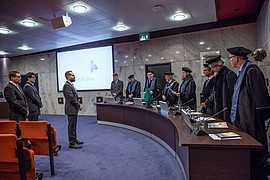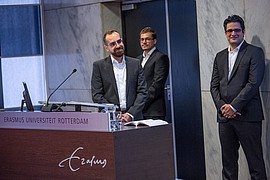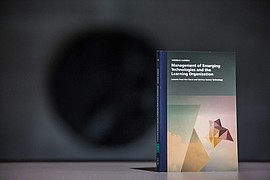PhD Defence: Andreas Alexiou

In his dissertation ‘Management of Emerging Technologies and the Learning Organization: Lessons from the Cloud and Serious Games Technology’ ERIM’s Andreas Alexiou looks into how specific organizational capabilities contribute to the successful management of emerging technologies. Furthermore, his study explores the potential of an emerging learning technology in facilitating learning and training in organizations
Andreas defended his dissertation in the Senate Hall at Erasmus University Rotterdam on Friday, 28 October 2016 at 11:30. His supervisor was Prof. Slawomir Magala and his co-supervisors were Prof. Ilan Oshri and Prof. Michaéla Schippers. Other members of the Doctoral Committee were Prof. Lucas Meijs, Prof. Erik van Heck (RSM, Erasmus University) and Prof. Dimitris Assimakopoulos (Lyon Business School)
About Andreas Alexiou

Andreas Alexiou was born on August 3rd, 1981 in Larisa, Greece. He studied International and European Economics and Politics at the University of Macedonia, Thessaloniki, Greece where he obtained a bachelor’s and a master’s degree focusing on International Economics. He then continued his studies at the Warwick Business School, University of Warwick, UK, where he graduated with a master’s degree in Information Systems and Management in 2008 before continuing as a PhD Candidate at the Rotterdam School of Management, Erasmus University. He joined the Strategy and Entrepreneurship department of RSM in 2010 as a Marie Curie early stage researcher and part of the MANETEI (Management of Emerging Technologies for Economic Impact) project.
His main research interests include the micro-foundations of organizational learning, management of emerging technologies, and learning/training effectiveness of digital game-based technology. He presented his work at leading international conferences including Academy of Management (2013, 2014, 2015), European Group for Organizational Studies (2013) and European Academy of Management (2011, 2012) annual meetings. His articles have been published in Psychology (2012) and the Managing Emerging Technologies for Socio-Economic Impact, Assimakopoulos, D., Oshri, I., Pandza, K. (Eds.), Edward Elgar (2015), and other articles are currently under review in leading management and information systems journals. In addition to his research he has lectured and supervised students in the bachelor’s and master’s programs of Rotterdam School of Management, Erasmus University and Amsterdam Business School, University of Amsterdam.
Thesis Abstract

The scope of this dissertation is twofold. On the one hand, it looks into how specific organizational capabilities contribute to the successful management of emerging technologies. In this context it enhances our understanding of the role of absorptive capacity and organizational resilience in the processes of adoption and management of disruptive technological change. Moreover, it reveals the important role of organizational energy (the shared experience and demonstration of positive affect, cognitive arousal, and agentic behavior among unit members) as an enabler of absorptive capacity.
On the other hand, it explores the potential of an emerging learning technology (i.e. Serious Games) in facilitating learning and training in organizations. To this regard, it provides with a roadmap for future research by highlighting the role of the different technological aspects in supporting user engagement and motivation and consequently learning. At the same time, it explores the moderating role of user personality and discusses the various opportunities and challenges for organizations from a learning theory perspective. Finally, it provides empirical evidence for the important but usually neglected role of narrative and aesthetics in facilitating learning in game-based learning applications
Photos: Chris Gorzeman / Capital Images


